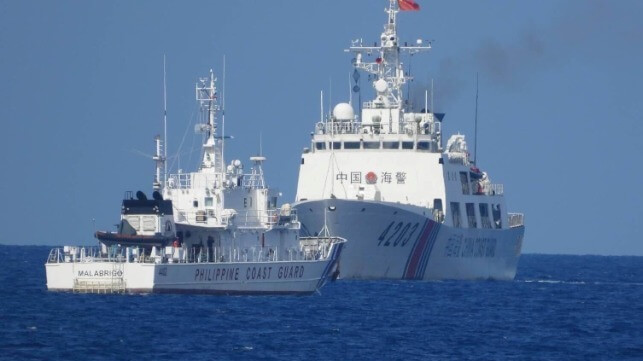PCG: China Coast Guard More Restrained After "Name and Shame" Campaign

The Philippine Coast Guard's "name and shame" campaign to highlight aggressive Chinese maritime behavior is beginning to pay off, a spokesman said Thursday.
The China Coast Guard and Chinese maritime militia have a longstanding reputation for interfering with Philippine interests in the Spratly Islands, where China has established a string of military bases on contested land features. For years, Philippine fishermen have complained of Chinese forces harassing them or driving them away from desirable fishing grounds, like Scarborough Shoal. The Philippine Coast Guard has also reported run-ins with larger China Coast Guard vessels on dozens of occasions.
Over the past year, the PCG has begun publishing photos and written accounts of the China Coast Guard's aggressive behavior, hoping that exposing and documenting it would prompt Chinese leadership to rein in some of the worst abuses. That campaign is beginning to show results, according to PCG spokesperson Commodore Jay Tarriela.
"In some features of the West Philippine Sea, we can already see some of the changes of behavior of the Chinese Coast Guard. Before they were aggressive all over the West Philippine Sea," Tarriela told Philippine outlet ANC.
However, that trend does not yet extend to Second Thomas Shoal. This reef is home to an isolated garrison of Philippine marines, who maintain Manila's claim on the land feature in the face of constant Chinese pressure. The outpost - a dilapidated WWII landing ship which was intentionally grounded for use as a base - has to be resupplied by convoy, and this regular operation is a recurring source of friction with the China Coast Guard. In past run-ins, the CCG has allegedly used water cannon, military-grade illuminating lasers, and aggressive maneuvers to block the passage of Philippine vessels on the resupply run.
Just last Friday, PCG cutters headed for Second Thomas Shoal were intercepted by the China Coast Guard as soon as their convoy came within 12 nautical miles of the shoal. The convoy was "constantly followed, harassed, and obstructed by the significantly larger Chinese Coast Guard vessels," according to Tarriela, and the Chinese vessels "blatantly disregard the Convention on the International Regulations for Preventing Collisions at Sea (COLREGs)." Photos from the scene appear to show a large CCG vessel cutting across the bow of the PCG cutter Malabrico.

that matters most
Get the latest maritime news delivered to your inbox daily.
While this behavior is concerning - U.S. Secretary of Defense Lloyd Austin characterized it as "coercive and risky" - it is now the exception rather than the rule in the Spratly Islands, thanks in part to the Philippine effort to publicize it.
"What is happening in Ayungin Shoal is different from the entire operation of the Chinese Coast Guard and our deployment of the Philippine Coast Guard vessels in the entire West Philippine Sea," Tarriela told ANC.
